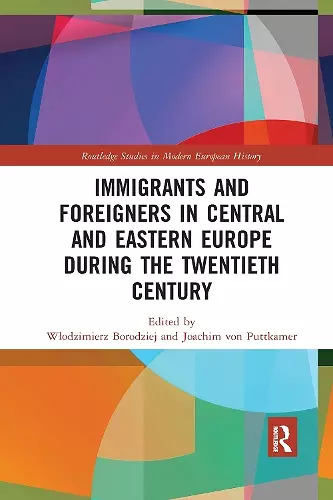Immigrants and Foreigners in Central and Eastern Europe during the Twentieth Century
Włodzimierz Borodziej editor Joachim von Puttkamer editor
Format:Paperback
Publisher:Taylor & Francis Ltd
Published:30th Sep '21
Should be back in stock very soon
This paperback is available in another edition too:
- Hardback£145.00(9780367085827)

Immigrants and Foreigners in Central and Eastern Europe during the Twentieth Century challenges widespread conceptions of Central and Eastern European countries as merely countries of origin. It sheds light on their experience of immigration and the establishment of refugee regimes at different stages in the history of the region.
The book brings together a variety of case studies on Poland, Hungary, Czechoslovakia, and Yugoslavia, and the experiences of return migrants from the United States, displaced Hungarian Jews, desperate German social democrats, resettled Magyars, resourceful tourists, labour migrants, and Zionists. In doing so, it highlights and explores the variety of experience across different forms of immigration and discusses its broader social and political framework.
Presenting the challenges within the history of immigration in Eastern Europe and considering both immigration to the region and emigration from it, Immigrants and Foreigners in Central and Eastern Europe during the Twentieth Century provides a new perspective on, and contribution to, this ongoing subject of debate.
This collection from editors Borodziej (Warsaw Univ., Poland) and von Puttkamer (Jena Univ., Germany) covers relatively little-known cases of refugees and migrants: Jewish refugees living in railway cars near Budapest in the 1920s, the thousands involved in the Czecholovak–Hungarian population exchanges following WW II, and refugees from Nazi Germany in Czechoslovakia. The most recent case in the book is that of southeast Asian and African refugees arriving in Hungary in the 1960s. One case, about Poles returning from the US in the 1920s, shows how difficult it is even for immigrants to reintegrate in the country they had left only years before. The common theme binding these diverse chapters is that movements of people generate social, economic, and political disruption. The final essay sketches refugee crises that followed great wars and the domestic and international efforts to address them. A particularly difficult case was that of displaced persons (DPs) in defeated Germany as Moscow sought to forcibly repatriate Balts and others who had fled the Soviet Union during the war. Although these essays add only slivers of information to the narratives of migrant issues, the book is recommended for its histories—with rich footnoting—of obscure migrant cases.
- - R. P. Peters, Harvard University, CHOICE magazine
ISBN: 9781032174266
Dimensions: unknown
Weight: 254g
176 pages